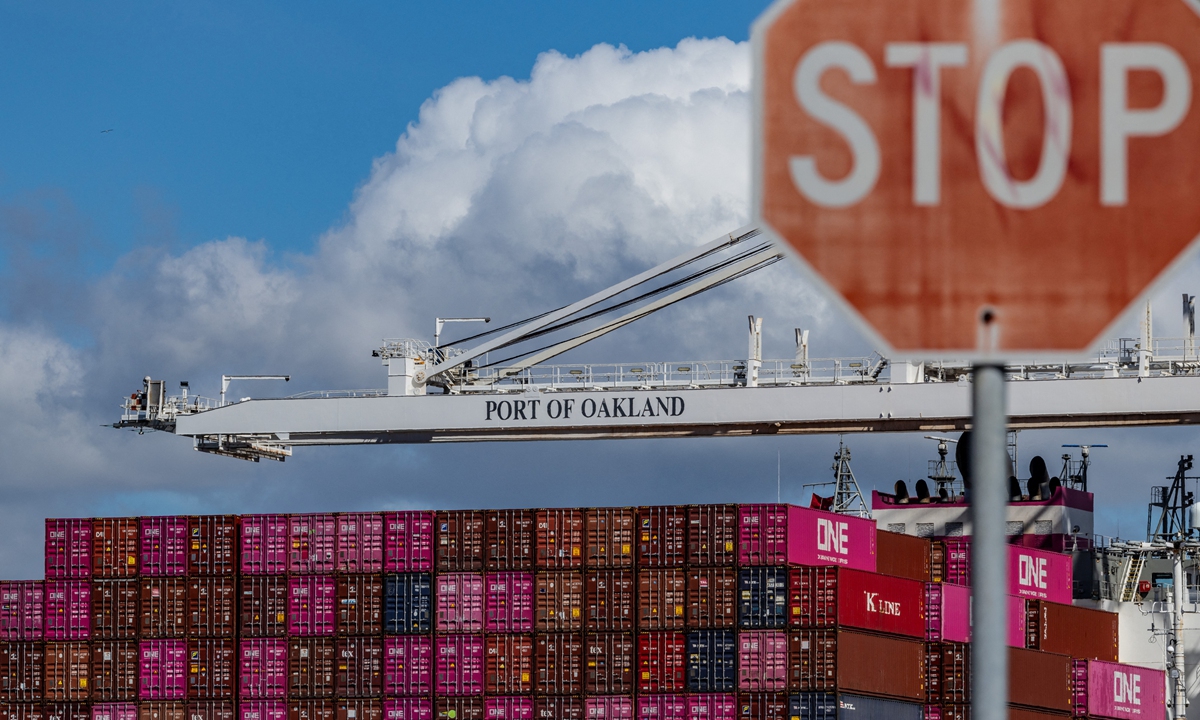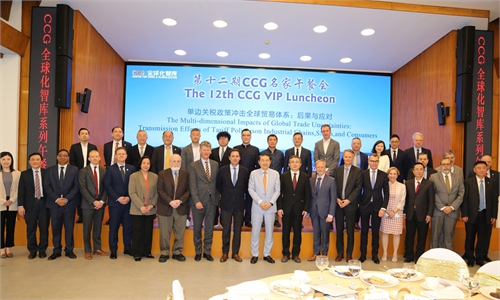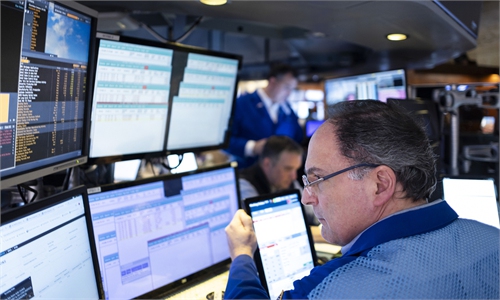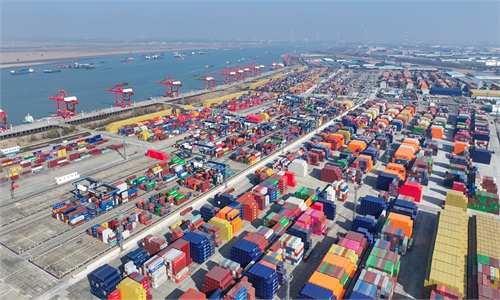China vows to defend multilateral trade order, calls 245% US tariffs a ‘numbers game’

A cargo ship full of shipping containers is seen at the port of Oakland as trade tensions escalate over US tariffs, in Oakland, California, US, on March 6, 2025. Photo: IC
When asked to comment on media reports that China will convene an informal meeting of the UN Security Council next week to discuss the issue of the US imposition of additional tariffs, Chinese Foreign Ministry spokesperson Lin Jian said on Thursday that China supports the international community in conducting discussions through various platforms, including the UN Security Council, to gain a deeper understanding of the harms of unilateralism and bullying acts, reaffirm the commitment to multilateralism and the purposes and principles of the UN Charter, and build consensus for strengthening the role of the United Nations and safeguarding the legitimate development rights and interests of all countries.
The US, disregarding the balance of interests reached through multilateral trade negotiations, has abused tariffs under the pretext of seeking reciprocity and fairness, which is dealing a heavy blow to the global economic order and the multilateral trading system, and seriously undermines the interests and well-being of all countries, Lin said.
The remarks came after the White House said China is facing up to a 245 percent tariff on imports to the US "as a result of its retaliatory actions," the Newsweek reported on Wednesday.
In response, a Chinese foreign ministry spokesperson said on Thursday that the US' 245 percent tariff on certain products from China no longer makes economic sense. The spokesperson pointed out that China has made it very clear that the US' extortionate tariff hikes on China have become a numbers game, which economically does not make much actual difference anymore, except to further demonstrate how the US weaponizes tariffs to coerce and bully others.
China's Ministry of Commerce (MOFCOM) has maintained working-level communication with its US counterpart, the ministry said on Thursday.
China's position has been clear and consistent, which is being open to consultations with the US side on economic and trade issues, said spokesperson He Yongqian at a regular press conference on Thursday. "The unilateral tariff hikes were initiated entirely by the US side, and it is up to the one who tied the bell to untie it," He said.
During the Group of 20 (G20) Development Working Group meeting from Monday to Wednesday in Western Cape Province, South Africa, China expressed its position on the US proposal for "reciprocal tariffs." Multiple parties called for the joint safeguarding of the multilateral trading system and opposition to unilateralism and trade protectionism, according to a MOFCOM statement released on Thursday.
Cui Fan, a professor at the University of International Business and Economics, told the Global Times on Thursday that China's rational and open stance reflects its sense of responsibility as the world's major trading nation and highlights the fundamental differences in the trade philosophies of China and the US, namely, respect for international trade rules or not.
"The US has become a disruptor of the multilateral order, while China remains its staunch defender," Cui said, noting that China's opposition to unilateral tariff policies is not merely about defending its own rights, but also about safeguarding the multilateral system and global trade rules, serving as an example for other nations confronting trade coercion.
Growing backlash
The US' sweeping tariffs, which have faced great opposition since their announcement, have been facing even more backlash in recent days.
An aggressive US tariff policy will trigger a significant slowdown in the US economy this year and next, with the median probability of recession in the next 12 months approaching 50 percent, Reuters reported on Thursday, citing its economists polled.
On Wednesday, California Governor Gavin Newsom filed a lawsuit challenging the Trump administration's spate of tariffs that have upended global trade, BBC reported, noting that California is the first US state to file legal action against the Trump administration over the tariffs.
The Trump administration's "unlawful tariffs are wreaking chaos on California families, businesses, and our economy - driving up prices and threatening jobs. We're standing up for American families who can't afford to let the chaos continue," Newsom said in the statement.
Kentucky Governor Andy Beshear is raising alarm bells over tariffs that are under consideration by the US administration, saying they will end up costing American families thousands of dollars, The Hill reported on Wednesday.
Federal Reserve chairman Jerome Powell also warned on Wednesday that the US' larger-than-expected tariffs likely mean higher inflation and slower economic growth. He noted the US central bank would wait for more data on the economy's direction before making any changes to interest rates.
After the warning, President Donald Trump called for the termination of Powell for not cutting interest rates fast enough — a criticism he has levied multiple times in a long-standing feud between the president and the Fed chair, CNN reported.
Song Guoyou,a deputy director of the Center for American Studies at Fudan University, told the Global Times that Trump's tariffs affect nearly all major trading partners, significantly damaging the US economy—especially export-dependent states with close ties to Asia-Pacific economies, which are primary targets of the tariff war.
"States like California and key industries are under immense pressure. The US government's capricious tariff policies have left businesses confused and passive," Song said.
Opposition with solidarity
Despite the US government's hard stance, the US business community has voiced its opposition against US tariffs through pragmatic moves.
Jensen Huang, CEO of US chip giant Nvidia, said on Thursday in Beijing - three months after his previous visit - that the company will serve the Chinese market unswervingly. He highlighted He highlighted China's strengths in the consumer market, booming industrial ecology, and software prowess, according to a report by China Media Group (CMG) on Thursday.
Wang Huiyao, Director of the Center for China and Globalization and former State Council advisor, said the current US administration misjudged global trade dynamics.
Wang told the Global Times that Washington's erratic tariffs underestimate the interconnectedness of the 80-year-old global trade system: "They focus only on goods trade deficits while ignoring $300 billion in services trade surpluses and benefits as the world's top investment destination."
"The current US administration has played its heavy-handed trade 'cards' but has already faced swift backlash from markets, businesses, and consumers," Wang added.
The WTO sharply cut its forecast for global merchandise trade from solid growth to a decline on Wednesday, saying further US tariffs and spill-over effects could lead to the heaviest slump since the height of the COVID pandemic, according to Reuters.
The WTO said it expected trade in goods to fall by 0.2 percent this year, down from its expectation in October of 3.0 percent expansion. "I'm very concerned, the contraction in global merchandise trade growth is of big concern," WTO Director General Ngozi Okonjo-Iweala told reporters in Geneva.
Ma Jianchun, President of the China Society for WTO Studies, stressed that the US administration's "America First" protectionism severely undermines the global trade system. "US tariffs are not just a China-US issue but an attack on global trade rules. This must be resolved through the WTO framework," Ma told the Global Times.
Ma noted that China's resilience, backed by its massive economy, manufacturing strength, and domestic market, enables it to resist unfair pressure. "China's firm response defends not only its own rights but also the multilateral trading system for all members—especially developing economies."



